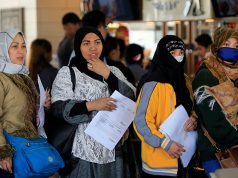
An OFW working as a nurse of a military hospital in Kuwait for 10 years is afraid to come to the Philippines for the graduation of her three children because she might not be allowed to go back.
She is just one of the more than 250,000 documented overseas Filipino workers in Kuwait whose jobs hang in the balance after diplomatic relations with the oil-rich gulf state turned sour and President Duterte declared a permanent ban on OFW deployment.
Patricia Lee Yanga, a graduating student from UST, shared on Twitter how her mother is affected by the diplomatic tensions.
Duterte causing so much hassle in this Kuwait-PH relationshit that my Mom cant go home for our graduations
— lee (@patleecia_) April 29, 2018
“My mother has been planning her vacation here since [2017] because my siblings and I are graduating this June. However, because of Duterte’s threats of the travel ban, she is afraid that she might not be able to go back to Kuwait,” Yanga said in an interview with Interaksyon.
Yanga, who is taking up journalism, said her mother had not experienced any form of abuse in the 10 years she has worked there.
She has a twin sister graduating from nursing in Trinity University of Asia and their youngest brother is graduating from Senior High School in UST.

She said that she knew the good intentions of the president for his decision, but it was “too impulsive and very short-term.”
“Duterte is promising jobs here in the Philippines, but I don’t think he sees that there isn’t enough here,” Yanga noted.
“[My mom] will have to check again next week if she will come home or if she will have to cancel her flight,” she added.
We have now a deployment ban in Kuwait. Great number of OFWs are now subject for non-employment. Ang galing talaga ng Presidente! Napaka-selfish!
— Claudine (@getclaud) April 30, 2018
“The ban stays permanently. There will be no more recruitment, especially for domestic helpers,” Duterte said last April 29 upon arriving from Singapore.
Labor Secretary Silvestre Bello III contradicted Duterte saying: “Reports are sometimes inaccurate. The President reportedly said the ban is now permanent – that is not the case. The President had said from the start that the deployment ban will stay for as long as there is no (memorandum of understanding) and there is no justice.”
Government officials initially thought that all was well with the oil-rich Gulf nation after the Department of Foreign Affairs Secretary Alan Peter Cayetano apologized for the supposed illegal “rescue” of distressed Filipino household workers there.
On April 25, Kuwait declared Philippine ambassador Renato Villa as persona non grata and recalled their own “for consultation.”
This turn of events prompted President Rodrigo Duterte to announce that the deployment ban of overseas Filipino workers was permanent.
Many Filipinos expressed theirs fears and confusion with the effects of the deployment ban and the uncertainty of signing the MOU of both countries.
Fear of not being able to return
The suspension of deployment was announced in January to supposedly to prevent further deaths of Filipino migrant workers in Kuwait.
However, with the ban yet to be lifted and Duterte’s urging for OFW’s to return home, several Filipino workers there opt to stay out of fear that they may not be able to return anymore.
Although Bello had clarified in a report that the MOU will still be signed, people on social media reacted differently.
Sass Rogando Sasot, a known Duterte supporter, made a Twitter post that received negative feedback among many users.
PRRD cancelled MOU with Kuwait! Bravo!!!!!
— Sass Rogando Sasot (@srsasot) April 28, 2018
One user, Dhonna Salazar, pointed out in her reply that people should also look out for other Filipino workers in Kuwait.
“The MOU will protect us who works hard here for the sake of our families. Not all workers here are being abused and maltreated,” she explained in her reply.









